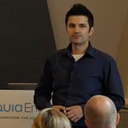Avi, your article resonates deeply with a concept I've been grappling with - the inherent desire for intuitive understanding, not just in design, but in the very fabric of our interactions. This reminds me of two striking examples from the seemingly simple world of "Paw Patrol," which, surprisingly, hold profound lessons on user experience.
Scene 1: The Pup-Fu Master
In this episode, Ryder introduces a new vehicle, a technologically advanced hovercraft. He doesn't hand out manuals or conduct lengthy training sessions. Instead, he demonstrates its basic functions, allowing each pup to explore its controls firsthand. Chase, initially apprehensive, tentatively manipulates the joystick. The hovercraft responds with unexpected agility, causing Chase to stumble. Yet, through playful trial and error, he masters the controls, his fear replaced by exhilaration. This scene encapsulates the power of experiential learning. The hovercraft, while complex, becomes understandable through direct interaction. Ryder, as the 'designer', recognizes the value of intuitive feedback over explicit instruction.
Scene 2: Tracker's Jungle Rescue
Tracker, a pup with bilingual skills and knowledge of the jungle, joins the team on a mission to rescue Carlos, who is trapped amidst ancient ruins. Tracker doesn't rely on complex maps or convoluted instructions. Instead, he utilizes his innate understanding of the environment, interpreting animal calls and deciphering subtle clues. He navigates the jungle with an almost instinctive grace, leading the team to Carlos. This scene beautifully illustrates the importance of contextual awareness in design. Tracker's success stems not from technical expertise but from his ability to seamlessly integrate with his surroundings. The 'design' of the jungle, while seemingly chaotic, becomes intelligible through contextual knowledge.
Both scenes underscore a crucial point: Users, be they pups or people, yearn for a direct, intuitive engagement with their world. They crave experiences that empower them to learn and adapt organically, not through cumbersome manuals or rigid protocols.
As Ryder often reminds us: "Whenever you're in trouble, just yelp for help." Perhaps this isn't just a catchphrase for emergencies, but a broader philosophy.
